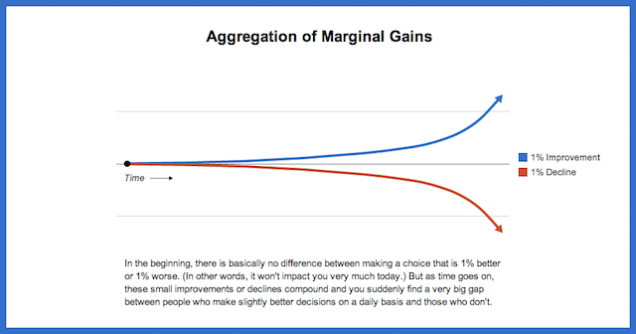Improve Every
Tiny Thing by 1% and Here’s What Happens
 |
| Sir David Brailsford |
In 2010,
Dave Brailsford faced a tough job.
No British
cyclist had ever won the Tour de France, but as the new General Manager and
Performance Director for Team Sky (Great Britain’s professional cycling team),
Brailsford was asked to change that.
His
approach was simple.
Brailsford believed in a concept that he referred to as the “aggregation of marginal
gains.” He explained it as “the 1% margin for improvement in everything you
do.” His belief was that if you improved every area related to cycling by just
1%, then those small gains would add up to remarkable improvement.
They
started by optimising the things you might expect: the nutrition of riders,
their weekly training program, the ergonomics of the bike seat, and the weight
of the tires.
But
Brailsford and his team didn’t stop there. They searched for 1 percent
improvements in tiny areas that were overlooked by almost everyone else:
discovering the pillow that offered the best sleep and taking it with them to
hotels, testing for the most effective type of massage gel, and teaching riders
the best way to wash their hands to avoid infection. They searched for 1%
improvements everywhere.
Brailsford
believed that if they could successfully execute this strategy, then Team Sky
would be in a position to win the Tour de France in five years time.
He was wrong. They won it in three years.
In 2012,
Team Sky rider Sir Bradley Wiggins became the first British cyclist to win the
Tour de France. That same year, Brailsford coached the British cycling team at
the 2012 Olympic Games and dominated the competition by winning 70 percent of
the gold medals available.
 |
| Sir Bradley Wiggins winning a time trial in the Tour De France |
In 2013,
Team Sky repeated their feat by winning the Tour de France again, this time
with rider Chris Froome. Many have referred to the British cycling feats in the
Olympics and the Tour de France over the past 10 years as the most successful
run in modern cycling history.
 |
| Chris Froome winning the Tour de France |
And now for
the important question: what can we learn from Brailsford’s approach?
The
Aggregation of Marginal Gains
It’s so
easy to overestimate the importance of one defining moment and underestimate
the value of making better decisions on a daily basis.
Almost
every habit that you have — good or bad — is the result of many small decisions
over time. And yet,
how easily we forget this when we want to make a change.
So often we
convince ourselves that change is only meaningful if there is some large,
visible outcome associated with it. Whether it is losing weight, building a
business, traveling the world or any other goal, we often put pressure on
ourselves to make some earth-shattering improvement that everyone will talk
about.
Meanwhile,
improving by just 1% isn’t notable (and sometimes it isn’t even noticeable).
But it can be just as meaningful, especially in the long run.
And from
what I can tell, this pattern works the same way in reverse. (An aggregation of
marginal losses, in other words.) If you find yourself stuck with bad habits or
poor results, it’s usually not because something happened overnight. It’s the
sum of many small choices — a 1% decline here and there — that eventually leads
to a problem.
In the
beginning, there is basically no difference between making a choice that is 1%
better or 1% worse. (In other words, it won’t impact you very much today.) But
as time goes on, these small improvements or declines compound and you suddenly
find a very big gap between people who make slightly better decisions on a
daily basis and those who don’t.
This is why
small choices don’t make much of a difference at the time, but add up over the
long-term.
The Bottom
Line
Success is a few simple
disciplines, practiced every day; while failure is simply a few errors in
judgment, repeated every day.
—Jim Rohn
You
probably won’t find yourself in the Tour de France anytime soon, but the
concept of aggregating marginal gains can be useful all the same.
Most people
love to talk about success (and life in general) as an event. We talk about
losing 50 pounds or building a successful business or winning the Tour de
France as if they are events. But the truth is that most of the significant
things in life aren’t stand-alone events, but rather the sum of all the moments
when we chose to do things 1% better or 1%. Aggregating these marginal gains
makes a difference.
There is
power in small wins and slow gains.
Where are
the 1% improvements in your life?










